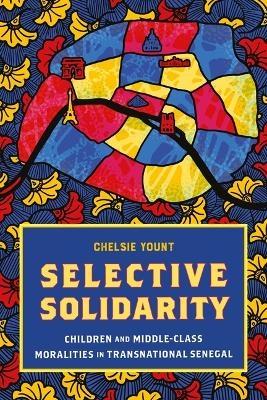
Selective Solidarity
Children and Middle-Class Moralities in Transnational Senegal
Seiten
2025
University of Pennsylvania Press (Verlag)
978-1-5128-2757-6 (ISBN)
University of Pennsylvania Press (Verlag)
978-1-5128-2757-6 (ISBN)
- Noch nicht erschienen (ca. Juni 2025)
- Versandkostenfrei
- Auch auf Rechnung
- Artikel merken
An ethnography of Senegalese households in Paris and Dakar that analyzes ways families negotiate transnational kinship
Selective Solidarity examines how global inequalities change the ways transnational families negotiate “economic moralities,” or expectations of familial material obligation. Analyzing everyday exchanges in middle-class Senegalese households in Paris and Dakar, this book traces links between the language that mediates acts of food sharing and gift giving, and moral discourses that shape redistribution beyond the household. Foregrounding children’s role in transnational relations, anthropologist Chelsie Yount urges us to rethink questions of agency in economic practice.
How do children grapple with the multiple, and sometimes contradictory, moral expectations they encounter at home and abroad? What can their practical struggles tell us about the ways the decline of the middle class in Europe impacts kinship connections in the African diaspora? The difficulties migrant parents face in transmitting class status to their French-born children lays bare the fact that for visible minorities, “integration” is not a state one can achieve once and for all, but a process that can potentially be undone. Yount argues that the French-born children of Senegalese, acutely aware of the discrimination they face in France, also forge affective and economic connections abroad that are key to creating and reproducing transnational kinship.
At its heart, Selective Solidarity is about children’s experiences sharing food and giving gifts in Paris and on trips to Dakar. This book considers experiences of family life in global capitalism, focusing on middle-class downward mobility to highlight the ways socioeconomic relations are redefined as resources stretch thin. Highlighting the uneven terrain of transnational kinship, Selective Solidarity offers a new perspective on theories of value, revealing how moral expectations of kinship in Africa are bound up with values of immigrant integration in Europe. Together, these economic moralities shape families’ attempts to navigate the vicissitudes of tiered migration trajectories as heightened tensions surrounding migration reconfigure class structures globally.
Selective Solidarity examines how global inequalities change the ways transnational families negotiate “economic moralities,” or expectations of familial material obligation. Analyzing everyday exchanges in middle-class Senegalese households in Paris and Dakar, this book traces links between the language that mediates acts of food sharing and gift giving, and moral discourses that shape redistribution beyond the household. Foregrounding children’s role in transnational relations, anthropologist Chelsie Yount urges us to rethink questions of agency in economic practice.
How do children grapple with the multiple, and sometimes contradictory, moral expectations they encounter at home and abroad? What can their practical struggles tell us about the ways the decline of the middle class in Europe impacts kinship connections in the African diaspora? The difficulties migrant parents face in transmitting class status to their French-born children lays bare the fact that for visible minorities, “integration” is not a state one can achieve once and for all, but a process that can potentially be undone. Yount argues that the French-born children of Senegalese, acutely aware of the discrimination they face in France, also forge affective and economic connections abroad that are key to creating and reproducing transnational kinship.
At its heart, Selective Solidarity is about children’s experiences sharing food and giving gifts in Paris and on trips to Dakar. This book considers experiences of family life in global capitalism, focusing on middle-class downward mobility to highlight the ways socioeconomic relations are redefined as resources stretch thin. Highlighting the uneven terrain of transnational kinship, Selective Solidarity offers a new perspective on theories of value, revealing how moral expectations of kinship in Africa are bound up with values of immigrant integration in Europe. Together, these economic moralities shape families’ attempts to navigate the vicissitudes of tiered migration trajectories as heightened tensions surrounding migration reconfigure class structures globally.
Chelsie Yount is a postdoctoral fellow at Leiden University in the Netherlands.
| Erscheint lt. Verlag | 3.6.2025 |
|---|---|
| Reihe/Serie | Contemporary Ethnography |
| Verlagsort | Pennsylvania |
| Sprache | englisch |
| Maße | 152 x 229 mm |
| Themenwelt | Sozialwissenschaften ► Ethnologie |
| Sozialwissenschaften ► Soziologie ► Makrosoziologie | |
| ISBN-10 | 1-5128-2757-6 / 1512827576 |
| ISBN-13 | 978-1-5128-2757-6 / 9781512827576 |
| Zustand | Neuware |
| Haben Sie eine Frage zum Produkt? |
Mehr entdecken
aus dem Bereich
aus dem Bereich
deutsch-jüdische Lebensgeschichten
Buch | Hardcover (2024)
Wallstein Erfolgstitel - Belletristik und Sachbuch (Verlag)
CHF 67,20
queere Heldin unterm Hakenkreuz
Buch | Hardcover (2023)
Kremayr & Scheriau (Verlag)
CHF 33,55


